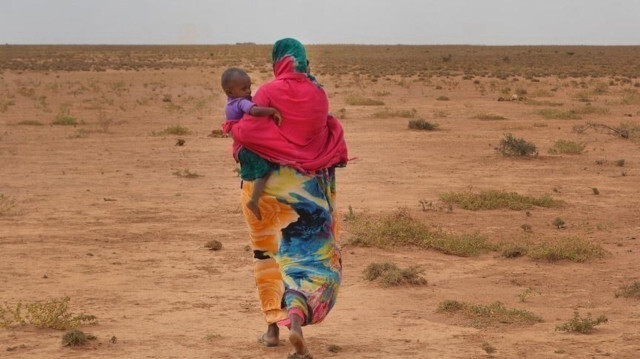
Quarter of Somalia's population displaced, highest figure ever recorded in East African nation, says Islamic Relief
A quarter of all people in Somalia are now displaced due to drought and conflict, as the country’s displacement crisis hits record levels, according to a UK-based humanitarian organization.
The Islamic Relief said in its latest report, which was released late Wednesday that more than 4.3 million people are internally displaced within Somalia – the highest figure ever recorded in the country, which has a population of around 17 million.
The drought in Somalia has not only killed people and livestock but also damaged crops, resulting in increased food prices and forcing many people into destitution, the report said, citing remarks by Farhan Abdirizak Adan, an Islamic Relief project officer based in Baidoa, one of the worst affected cities in the Horn of Africa country.
"I see so many women in the camps wearing white headscarves, which signify that their husbands have died from war or hunger," he was quoted as saying in the report.
He added that the situation in Baidoa is beyond imagination and that more people are arriving every day.
“It’s sad seeing people travel here in the hope of receiving aid, but there isn’t enough, so they have to wait weeks to start getting food. People have lost loved ones to hunger in that time. Without aid, many more people would be dying of hunger, but humanitarian agencies are short of funds, and we can’t help everyone,” he added.
The UN Food and Agriculture Organization (FAO) in a statement anticipated El Nino could affect 1.2 million people and inundate 1.5 million hectares (3.7 million acres) of land in Somalia from October.
The term El Nino refers to a warming of the ocean surface, or above-average sea surface temperatures in the central and eastern tropical Pacific Ocean.
It stated that riverine communities in Somalia are the most vulnerable, with an estimated 1.5 million hectares (3.7 million acres) of land at risk of flooding.
The FAO has emphasized "action now" in order to protect lives and livelihoods in the country.
“There is a short window of opportunity to intervene and prevent a large-scale humanitarian disaster,” the FAO said.
Somalia is one of the worst-affected countries in the region by draught, with 8.25 million people in need of humanitarian assistance.
Hello, the comments you share on our site are a valuable resource for other users. Please respect other users and different opinions. Do not use rude, offensive, derogatory, or discriminatory language.
The floor is all yours.








